The Journals of Ayn Rand Read online
Page 6
The boy is just their opposite. He is all passion, will, and uncompro mised absolutes. He takes everything seriously. Life is very serious and sacred to him. And, as Nietzsche said: “The noble soul has reverence for itself.” He has a profound reverence for himself, a determination to keep himself and his life clean, untouched, and beautiful, because they are the most sacred of all sacred things. And when he wants something—he wants it.
The tragedy of a man with the consciousness of a god, among a bunch of snickering, giggling, dirty-story-telling, good-timing, jolly, regular fellows.
All this is quite unconscious in the boy. He does not and cannot recognize it. He is too much of an “outsider” to understand the “inside.” He understands only enough to hate and despise it, as only he can hate and despise.
The boy has a marvelous, fascinating laugh. I must describe it in the beginning of the story, as Danny’s introduction: a clear, ringing laugh, the laugh of an unhesitating, unquestionable joy, the laugh of a sunny soul, the laugh of the real life itself. That laugh must show more than anything else what that boy is and what they are destroying.
The probable story: he is unjustly hurt and deeply insulted by a popular, “respectable” pastor, who is a condensed representative of the “little street.” [The injustice is such] that it damages, if not ruins, his life and career. He murders the pastor, as a revenge. The public is horrified, for the pastor was a very popular, “beloved” figure. The crime takes the aspect of a blow against the church, religion, civilization, humanity, etc. “The greatest crime ever...”
The boy is alone against all of society. He is everybody’s personal, hated enemy. He is caught, tried, and condemned to death. He escapes from jail. He is recognized on the outskirts of the town by a sneaky little man with a shiny old coat, protruding chin, tobacco-stained yellow lips and bad teeth. He is surrounded by a mob and lynched. Torn to pieces, beaten to death on the pavement with the water of the gutter running red.
The story ends with Hetty, the girl who loved him, going to a grocery store on a rainy November evening, sent by her mother to buy some hamburger and ten cents worth of chopped pickles.
And the last cry of the story, as the girl looks at the little street:
“I’m afraid, Mother, I’m afraid!”
Hetty, the girl.
A clear, straight soul. Like the “Prince-Flower.” [AR may be referring to a Grimms’ fairy tale, The Carnation, in which a beautiful girl is turned temporarily into a flower by a prince.] Very sensitive. Lonely. Not a strong, ambitious career woman, but—a woman. Bewildered by life. Unable to adapt herself to things as they are. In the end, left aimless, with nothing to live for and a terror of living—showing how empty a place this world is for one who does not and cannot share its vices and vicious virtues.
She is the only daughter of a stupid, indifferent father and a petty, [pushy], house-wife mother. The household is rather poor—it has too much to be shabby and not enough to have any education or refinement.
She loves the boy with a wilder passion than she can realize. She is usually too calm, restrained and frail to think herself capable of such a primitive, raw feeling, almost beast-like in its overwhelming [intensity]. She is the only one who feels the Super-Being in the boy, feels it, without completely understanding it. She is frightened by him sometimes, but she is always ready to take his side against everybody. She might sometimes think he is wrong, but she always feels he is right. Her antagonism to common life, her infinite longing for something above it, centers on him, as the only relief from it she has ever met. She is not a strong, active, fighting enemy of that life. She does not even fully realize [the nature of] that life, because she is straight, honest, and “outside of it.” But she feels, blindly and instinctively, the horror of that life and she feels the boy is the only one who is so far and so high above it. Without her realizing it, her love for him is her love for life—her religion, hope, ambition, pride, and future—all these things having no particular meaning to her, the intensity of her feeling centered on one thing: him.
The whole of her tragedy is brought out in the last scene. He escapes from jail after being sentenced to death, and comes to her because she is the only person he can trust. But he is [forced to leave] her house; her mother is threatening to call the police and her father is expected to return home any moment and would be sure to denounce the criminal who is loathed by all mankind. In these moments, when she sees herself alone against the world, when she sees herself so little and helpless in facing the monster of humanity, when she sees the octopus that has caught in its sucking [tentacles] the one who is sacred beyond all sacredness to her—then she understands life for the first time. (And so must my readers.)
(The model for the girl: the “Prince-Flower,” qua modem; and myself, qua weak—the idealistic, longing side of me.)
She is medium height, very slim, rather frail. Not beautiful, but exquisite in her own way. Thin features. Brown hair. Gray eyes with long eyelashes. A fascinating smile that makes her look beautiful: a very feminine, delicate, and tempting smile.
The boy is not in love with her. He has never been in love. But he knows that she loves him. And he feels something like love, although it is more physical desire in the last scene when he kisses her wildly; he is feeling the call of life, when he is so near to losing it.
Just as the boy [embodies] the perfect egoism and will to live—the girl [embodies] the perfect love, the kind of overwhelming, intense, absolute passion that is so alien, so out-of-place on the “little street.” To her the so-called love problems have always been utterly impossible to understand. She doesn’t understand any tragedies of marriage, parents’ opposition, social obstacles and such. The love that she knows is something so immense, so dominant, so unquestionable, that she cannot see anything being considered beside it or opposed to it.
As a relief for the whole book, the few moments that she spends with him when he is hiding in her house, when they kiss each other for the first and last time, must be trembling with the intensity, joy, and ecstasy of life. This scene must show what is possible and what is being destroyed by the little street. The stronger the contrast, the better. The reader must feel an actual pain, and the wild desire to yell for something that can’t be explained in words—the life that no one knows.
The Pastor
[An early version of Ellsworth Toohey in The Fountainhead.]
He has everything that “the little street” has and nothing that it should have. A small soul choked with a poisonous ambition to dominate and crush everybody and everything. Not the kind of passion for power that says: “I want to rule because I know that I am superior to others and I must dominate them”; but the kind that says: “I know that I am inferior and therefore I don’t want to let anything superior exist.” This is subconscious, of course, because one of those muddy souls would never admit it to itself. Consciously, it believes that “we are all equal” and defends that equality with all the jealous, greedy zeal of a bulldog that has his teeth sunk into a piece of meat; the dull, despotic zeal of mediocrity that is [concerned with] the equality of those above, which it wants to pull down, and not with those below, which it [allegedly] wants to pull up.
The pastor has no idea out of the ordinary, the common, the established and he does not want any such ideas to exist. He is not a clever hypocrite that despises the mob and only plays up to it to attain his own aim. He is the lowest, most poisonous, most dangerous type—the ambitious mediocrity. He wants to believe that the mob he serves really is the ruler and the lord of the world. He has no aim outside of that mob. He wants to believe that the mob’s ideas are the standards of the universe; that he is absolutely right in his petty, narrow little convictions; that everybody must not only obey these ideas, but actually believe them.
He knows how much of a blood brother he is to the mob. He also knows that there are those who stand far above it, and he wants to drag them down to the level of the mob, where he is the master [because he is] the best, “condensed” representative of that mob. He’s a devastating picture of a dull, diseased ambition that has filled [an otherwise] empty soul. The ambition of a skunk that knows the bad smell is his only strength and therefore makes it the highest principle of life on earth.
His ideas are the means for “equality,” for bringing higher men down to his level. His thinking is muddy enough to [demand] an absolute obedience to these ideas from others, but not from himself. He isn’t above having filthy little love affairs, accepting money when doing so is quite safe although not quite clean, and forgiving in his “friends” the sins for which he would destroy an “enemy” (i.e., an “outsider”).
He is tall and rather flabby, although he gives the impression of being thin. Has a narrow, lined, yellowish face with the proud, austere expression of a saint. He has little, damp, lusty eyes and the thin, dry lips of a cold hypocrite. He has white hands with short, fat fingers and shapeless fingernails that are more wide than long. Likes to wear rings. Has thin, straight hair which is beginning to gray, with a bald spot showing rosy and soft like the flesh of a baby. He has a deep, slow, dignified voice and a hee-hee-ing, indecent, insincere laugh.
He is a very prominent figure. Especially popular among the semi-literate lower classes, the ones that are always ready to fall for religious preaching. To some, he is a beloved and respected “father”; others are rather indifferent themselves, but will not tolerate any disrespect or disbelief of him and are always ready to defend him furiously against anyone doubting his authority. The business magnates and such despise him and feel an instinctive disgust toward him, but they have to tolerate and stay on good terms with him for fear of his dark, “backstage” power.
He hates all successful people. A successful man, in any line,
is his personal enemy. He rejoices at every failure and at the fall of every idol.
(The model for the pastor: the pastor of the Ku Klux Klan that I read about. The movie censors. All “reformers.” An endless list of “little street‘ers” that I will note down as they come.)
[Other Characters]
A fat woman that has made her immense fortune by having bad houses [houses of prostitution]. An influential, respectable citizen. Very proudly conscious of her power. Ambitious to get or buy everything she wants. Convinced that there is nothing so high that she cannot get it. She marries a brilliant, aristocratic, divinely handsome young man, Eric “Goldenlocks.” Marries him because she “can afford to have a pretty boy in her bed” if she wants one.
Eric is poor, ambitious, conceited and not very strong. He just sells himself, marrying her for her money, knowing all about her and the source of her fortune. He is tall, with blue eyes, golden hair and all the Siegfried like, fresh, sparkling beauty of a snow-covered Scandinavian mountain peak on a sunny morning. He marries the woman. We see him later, with a heavy, flabby, ghastly white face, red eyelids, shiny nose, sagging double-chin, unkempt hair, muddled, expressionless eyes and the reputation of a chronic drunkard.
He had been in love, before his marriage, with a charming, brilliant girl from an old family, now poor and barely keeping up a decent appearance to support the dignity of their name. His marriage to the woman is a terrible blow to the girl. A middle-aged nouveau riche, a heavy, common brute, had been courting her in his ambition to possess something he felt to be so above him, a woman of the real aristocracy. She marries him now—in despair. We see her later, overdressed in an expensive and tasteless way, having for a lover a cheap, notorious “heartbreaker.” A little detail: before all this, a young college girl—romantic, sensitive, but not very attractive—has committed suicide over her hopeless love for the handsome Eric “Goldenlocks.”
A genius gone wrong. A handsome, brilliant young actor with a fine mind and a beautiful soul. Famous and successful, but gone wrong in that he is genuinely unhappy; his life is empty of desires or interests; he is cynical, tired, disgusted with everything—inside. Outside—he leads a wild life full of vice. He is not clear to himself, there is a continual chaos in his mind, regarding himself and the world. He does not know what he lives for or why he lives. He does not care—in an immense sense. An example of a fine frame that the little street has filled with its rotten content. Instinctively, he does not accept [the little street’s view of life], he revolts against it—but he has no other. And it is too late for another. He shows how empty the little street’s ideals are and what a wreck they make of an exceptional being. For they can’t fill such a soul and they do not permit the [ideals] that could fill it. He is utterly cynical and does not believe in anything. He could not accept the little street’s beliefs; they only killed in him all belief in believing.
The boy of the story shows how the little street wrecks an existing exceptional being. The actor shows how it wrecks such a being before he develops. The boy is an exceptional nature, and he is wrecked physically. The actor isn‘t, but could have been, and he is wrecked spiritually. The boy is a wonderful character, in spite of everything. The actor is not, but shows signs of what he might have been. The boy has his ego, his pride, his strength. The actor hasn’t anything. He does not even respect himself. He is despicable sometimes, and does not care. He is as empty of any high interest or feelings as a human being can be.
A “philosophical” prostitute. A creature that lives for one thing only and does not want to see anything else. Perfectly satisfied and proud of herself. She looks at things straight, realizes her power and is proud. The female representative of the little street—to match with the pastor. Except that she is more honest than the pastor. She sees the world as it is and laughs at all the high words and ideals. She knows their worth. She has no “high ideals.” She is openly rotten and satisfied with it, for the world is rotten and she has a right to say it. She is the voice of the little street when she says: that she is the real queen of life; that “decent” women have to share their men with her and be satisfied with what she leaves; that men’s respect for their “respectable” women isn’t worth a penny; that there is no man too high for her bed; that nothing is higher for men than what she gives them; and so on. She is a filthy creature who spits on all the high ideals of humanity and has a right to do it. For she does not lie. She only looks at things as they are and states the facts that the “decent people” are hypocritical enough to overlook and tolerate.
Things that will have to be shown and have characters to represent them
Sex filth. The real horror (and here I must gather all my strength to show it as strongly as possible) of respectable men having love affairs with the lowest kind of female filth. Show that a great man can’t be great if he associates (and associates in such a way!) with women he himself despises, that he is despicable himself if he does it. Show great men and young, promising boys with the disgraceful slime they make “love” to. All the things which they tolerate, which they allow themselves, thinking that they still have a right to keep their self-respect.
The hypocrisy of what men call love. A dull, lukewarm feeling of domestic-animal attachment and “respect” for their wives, not affected by affairs with “unrespectable” women.
The wives who tolerate their husbands’ unfaithfulness and are unfaithful themselves. Perfectly satisfied with such a marriage.
Mothers who approve of their sons’ vices and even help them in [such a course].
Influential, powerful men and the prostitutes who are their mistresses and who through these men get power over respectable people.
White-slavers.
Associations. The human herds. All the gatherings of average humanity which have but one aim: to ruin all individuals and individuality, to put “we” instead of “I” everywhere, to have a herd of submissive insiders against everyone outside who “does not belong,” everyone who has the courage and conscience to walk alone. The tyranny of number, of the multitude, of the average. Communism already established—unofficially.
Women ’s clubs. The poisonous hypocrisy of a secret revenge given power and influence. The revenge of failed mediocrities that glorify “virtue” because they have no chance to [engage in vice]. Sour old maids—not only physically, but spiritually as well. Women who failed in their private lives given the power to dictate an opinion and exercise an influence over the lives of others. Inferiors, speaking as superiors to society. Wrecks themselves—trying to wreck other lives.
Prominent, “respectable ” citizens. The intimate details of how they [rose]. Unpunished crooks who commit crimes against “society” and then furiously defend the rights of society against others. “Successful” men and what makes their success. The art of boot-licking. Patriots and their ferocious intolerance. Men killed and crippled for “their country.” And who and what is that country? Show the “great” men—in business, politics, art—and how small they are when one looks closely.
Home life. The stupid idealization of it, that tries to make it the highest ideal and aim for everybody. The dull, petty, purposeless existence that it is. The ridiculous smallness of it. Show young, promising people, full of life, and what they become with their “families.” The domestic-animal, eat-drink-and-sleep existence. The chewing-cow-in-the-sun contentment. The heavy, dumb, jail-like monotony of that life, day by day. [Note AR’s rejection of both the “family values” of conservatives and (earlier) the “feminism” advocated by many liberals.]
Narcotic-fiends. Those who buy it—and those who sell it, making fortunes [while remaining] uncaught and unpunished.
I leave these pages empty to be filled with [more descriptions of] those who constitute “humanity” and make up our great civilization, those for whom we are expected to live.

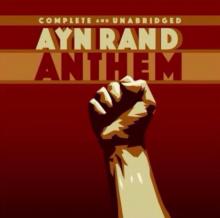 Anthem
Anthem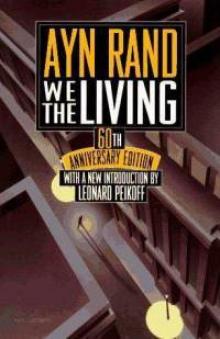 We the Living
We the Living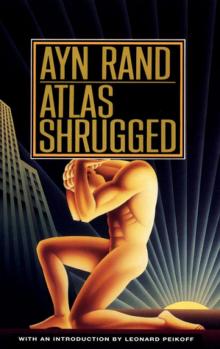 Atlas Shrugged
Atlas Shrugged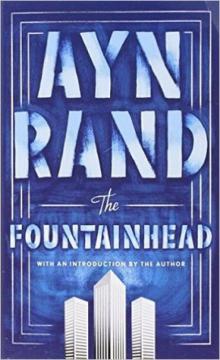 The Fountainhead
The Fountainhead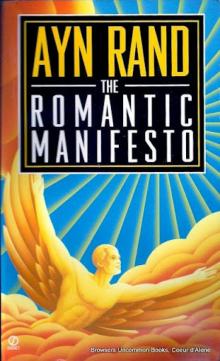 The Romantic Manifesto: A Philosophy of Literature
The Romantic Manifesto: A Philosophy of Literature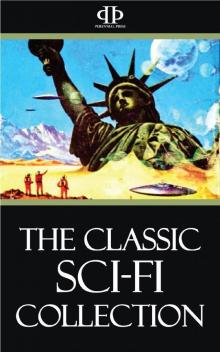 The Classic Sci-Fi Collection
The Classic Sci-Fi Collection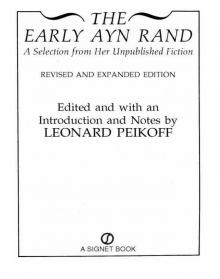 The Early Ayn Rand
The Early Ayn Rand